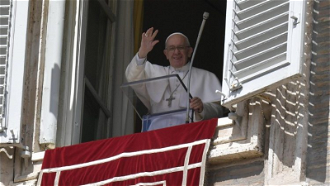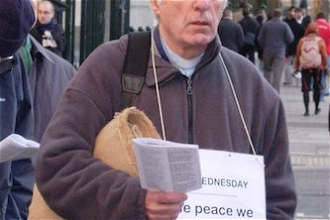Pope Francis: Every true conversion leads a new future

Source: Vatican Media
During the Angelus with pilgrims in St Peter's Square, Pope Francis reflected on the day's Gospel account of Jesus' merciful response to the woman caught in adultery.
The Gospel presents us with two conflicting attitudes, the Pope said: the attitude "of the scribes and Pharisees, on the one hand; and that of Jesus on the other."
The former, he explained wanted to condemn the woman caught in adultery, precisely because "they considered themselves the guardians of the law and of its faithful application." Jesus, however, desired to save her, "because He incarnates the mercy of God who redeems by forgiving and renews by reconciling."
Pope Francis said the Gospel makes it clear that the scribes and Pharisees had brought the woman to Jesus precisely in order to test him, and find something with which they could accuse Him. If Jesus said the woman should not be stoned, they could accuse Him of "disobedience" to the Law; but if He said she should be stoned, they could denounce Him to the Romans, who did not allow the Jews to exercise the death penalty.
"Jesus' interlocutors were closed in by the narrowness of legalism," the Pope said, "and they wanted to enclose the Son of God in their own perspective and condemnation." Jesus, though, came into the world "not to judge and condemn, but to save, and to offer people a new life." When Jesus said, "Let the one among you who is without sin, cast the first stone," He was appealing to the consciences of the men, reminding them that they, too, were sinful. "This scene invites each one of us, too, to realise that we are sinners," the Pope said, and calls us "to let fall from our hands the stones of denigration and condemnation, of gossiping that at times we would hurl against others." When we cast these stones at others, he said, we become like the scribes and Pharisees in the Gospel.
Quoting St Augustine, Pope Francis said that after all her accusers left, only the woman and Jesus remain, "the miserable one, and Mercy." Jesus does not condemn the woman, the Pope said, because "God 'does not will the death of the sinner, but rather that he be converted and live'."
But when He dismisses the woman, Jesus uses "these wonderful words: 'Go, and sin no more'." The Holy Father explains that Jesus, by acting mercifully, had opened "a new path" for the woman, a path that requires from her a commitment not to sin in the future. "It is an invitation that applies to all of us," Pope Francis said. "In this time of Lent, we are called to recognise that we are sinners, and to ask for forgiveness from God." And, he said in conclusion, that forgiveness helps us to begin our own story anew, because "every conversion is directed to a new future, to a new life, a beautiful life, a life free from sin, a generous life."





















